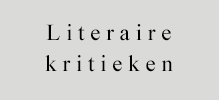Reportages
Op 7 oktober 2017 was het vijf jaar geleden dat Ivo Michiels overleed. Lars Bernaerts en Sigrid Bouset vroegen aan acht auteurs en aan zijn echtgenote om hun geliefde auteur sprekend in leven te houden.
Op zondag 8 oktober om 11 u. werd dit huldenummer van DW B ...
Alleen online: Not a Breath Wasted. Part three
Wednesday 24 August 2011
I was myself the compass of that sea.
I was the world in which I walked, and what I saw
Or heard or felt came not but from my self,
And there I found myself more truly and more strange.
(Wallace Stevens, Tea at the Palaz of Hoon)
And yet, Rick, Generosity celebrates optimism to a more daring extent than your other novels do. It is probably also your most overtly satirical book. The creative resilience and enterprise of Tim at the end of Gain in the ultimately energizing wake of the premature loss of his mother resurfaces very differently in Generosity???s Thassadit Amzwar who has lost her parents, in addition to her home and Berber culture, as well. Does fiction forge the wonder of optimism? The portrayal of your characters (often paired, often representative of ideas) and the generic features of the novel which you overtly discuss in Generosity celebrate individual resistance to the forces which you described in the previous paragraph. You evoke the reckless vulnerability which accompanies bliss in the character of Thassadit early on in the novel with the ominous reference to Robert Browning???s ???last Duchess??? who had ???a heart ??? how shall I say? -- to soon made glad, / Too easily impressed: she liked whate???er / She looked on, and her looks went everywhere.??? The ultimately inscrutable mystery of what brings a ???spot of joy??? to anyone???s cheek is connected with our transience as well. When Wallace Stevens writes that ???in contentment / I still feel the need of some imperishable bliss??? (Sunday Morning), he draws attention to our perishable nature, our disposability, and our reluctance to be contented with less. In the knowledge of the proliferating horrors which you describe above, how do we find what will suffice? Do we all need a creative nonfiction course of sorts to discover wonder in our lives? As I write this I also realize how much I think of your novels in terms of poetry (Wordsworth, Hopkins, Dickinson, Browning, Hardy, Plath, Stevens), and I wonder what your thoughts are on that as well?
Tuesday, August 30, 2011
Regarding the last question: guilty as charged, I???m afraid. Way back when I was first getting inspired by Professor Schneider to pursue literature, poetry was the medium that most compelled me. I wrote poetry for many years first, before turning to fiction. Oddly, the moment I started to write fiction, the poems stopped, except for humorous and occasional verse for friends, and the poetic interludes that punctuate some of the books (most notably Gold Bug). The books abound with quotes and allusions to canonical poems. And the rhythm and interiority, the philosophical and image-bent allegory of poetry is really what still drives my writing, much more so than the traditional contracts of plot, rising narrative tension, or the conventions of character.
Critics have sometimes accused my characters of being ideas on legs, and they???ll state the charge as if letting characters be driven by ideas or embody ideas deep in their temperaments were some kind of violation of fiction???s Prime Directive. Humans think incessantly, and ideas and emotions are different manifestations of entangled mental processes. Voiced idea is emotion. The job of consciousness seems to be to convert behavioral impulse and choice into a credible narrative chain of cause and effect: explanation, true or otherwise. Being alive is the process of testing out, rejecting, and revising fundamental hypotheses about both self and world. That constant process of theory-in-revision that consciousness relentlessly performs is precisely what I am most interested in representing. That???s why my books???as the initially unnamed narrator of Generosity observes about his own story???tend to hover somewhere between the reciprocal processes of realism and allegory. Our sense of self and our understanding of the world also hovers between those two same processes, and fiction is uniquely situated to represent that intersection of thought and feeling.
Our most primal idea about life???so primal that some may mistake it for an emotion!???may be the question of whether the things we care about stand a chance of working out well. Call the idea optimism, although we can mean many different things by the word. On what time scale does our hopefulness play out? (In the long run, as Keynes said, we???re all dead.) How broad a net can we cast, with the ???things we care about???? What values would need to be realized, by what measure, for us to be satisfied that something has ???worked out well???? In general, my books have been guided by Gramsci???s famous dictum: Pessimism of the intellect, optimism of the will. They tend to sink into very dark places, to concede the futility of most human desires, then, in some shift of level achieved by a character???s leap in consciousness (and usually just a few pages before the end), the narratives try to rise to a kind of quand m??me assertion of human persistence. So long as things continue, the human brain will continue to imagine ways of trying to make them work out well. And that, in itself, is a kind of meaning. Though much is taken, much abides, to quote another of your English canonical poets!
I???m delighted that you found Generosity an optimistic book. For me, the humor and satire are attempts to offset a pretty grim view of a present where we have begun to rewrite genetic legacy before we even know how to read it. The story concerns the nature and sources of happiness, and the rather American belief that pursuing and realizing happiness (through all manner of ???enhancements???) is a God-given right. It???s about inheritance and genetic determinism on the one hand, and revision via ???creative non-fiction??? on the other. Like so many of my other novels, it explores the fictive urge at the core of consciousness. But it???s also a story of runaway memes, the aggression of anonymous crowds, web disinhibition, and the quick and easy hysteria of a world on Twitter. It???s a portrait of a nation where a small few are embarked on more or less unregulated manipulation of genomic material for profit while a great many (more than 60%, in some polls) still refuse to believe in evolution. Am I optimistic about such a place? I???m reasonably sure, in any case, about the race???s endless ability (for better or worse) to keep revising its own story.
I read a great deal of positive psychology while researching the book. And I was struck by the findings on something called negativity bias. Evidence suggests that we tend to put about five times more emphasis on the occurrence of bad things than we place on good events of roughly equal significance. There???s obvious survival benefit to this: avoiding harm needs more attention than getting bonus strokes! But the upshot of the bias is that it tends to leave us almost neurotically incapable of measuring the real profits and losses we accumulate in the course of a day. And negativity bias may also explain our predilection for narrative that deals with darkness and dramatic setback. We dismiss stories without conflict or crisis???stories about happiness and optimism???as inherently uninteresting.
But for all our local bias toward the negative, we also seem to have undergone considerable selective pressure in favor of long-term sanguinity. The vast majority of people, when polled, say that, however miserable they currently are, they believe they will be happier in the future. Consciousness???s main job may be to keep that future viable. Fiction???s job is to catch consciousness in the act of doctoring the numbers, without foreclosing altogether on the confidence game. Pessimism of the intellect, optimism of the will.
Monday 5 September 2011
Perhaps
The truth depends on a walk around a lake,
A composing as the body tires, a stop
To see hepatica, a stop to watch
A definition growing certain and
A wait within that certainty, a rest
In the swags of pine-trees bordering the lake.
(Wallace Stevens, Notes Toward a Supreme Fiction)
In this last exchange, Rick, I???m taking up your reference to ???ideas on legs??? and asking you to elaborate on walking as a site of wonder. The optimism of the will in your characters, against the pessimism of the intellect, often manifests itself in walking. Your characters are surprised by the wonder which walking triggers, as if they had never really known what legs can be used for. When Laura, for instance, gets out of the ???fucking car??? she is rewarded by the surprise of wonder; she???s not so much walking away from something as moving into an enhanced state despite the obvious sadness and misery. During my years in Illinois I used to get stopped occasionally by police officers who wanted to know what I was doing, walking on my own like this. Admittedly, the route to Marketplace was not exactly scenic, or even safe for that matter considering the absence of any footpath, but I resented those passive-aggressive intrusions (???ma???am, can I help you???) to which the most innocent reply (???I???m fine, just walking???) seemed to suggest derisive subversion or insanity.  I remember my delight when you showed up at 206 E. Springfield one day and I realized that you had walked, imagine that. I go for a solitary walk most days and I feel bereft on the rare days that I can???t; it is the only way to make sense of things. In congenial company it is also, by far, my preferred mode of conversation; I relish the shared observation, the rhythm of synchronous movement, the unfolding of a plot with the occasional sideways glance as a kind of interactive punctuation. I like to believe that a National Biped Day would go quite a way towards shared wonder.
I remember my delight when you showed up at 206 E. Springfield one day and I realized that you had walked, imagine that. I go for a solitary walk most days and I feel bereft on the rare days that I can???t; it is the only way to make sense of things. In congenial company it is also, by far, my preferred mode of conversation; I relish the shared observation, the rhythm of synchronous movement, the unfolding of a plot with the occasional sideways glance as a kind of interactive punctuation. I like to believe that a National Biped Day would go quite a way towards shared wonder.
Friday 9 September 2011
Heidi,
I was wondering what you would propose for a final topic of conversation, given all the various professions and obsessions in the books that we might have wandered into. Your turn toward walking was a total surprise, but like all the best plot twists, it gives me all the satisfaction of something both unforeseen and inevitable, after the fact.
Walking is a huge part of my creative process. I walk almost every day???long, undirected, unmediated rambles that can last for a couple of hours. I probably log between 150 and 200 km on average, every month. Walking is my primary mode of transportation and one of my great sources of recreation. Something about the release of walking is incredibly conducive to fluid thought. I???ve come up with all kinds of material and ideas while in the state of blank attentiveness that walking requires. This relationship between walking and invention has been frequently noted by researchers and students of creative thought. I recently came across Mihaly Csikszentmihalyi???s formulation of the link, in his book, Creativity:
When we think intentionally, thoughts are forced to follow a linear, logical???hence predictable???direction. But when attention is focused on the view during a walk, part of the brain is left free to pursue associations that normally are not made.
The slow navigation of walking???moving through the world, correcting your course, beacon by beacon???seems related to all kinds of mental processes and pleasures including memory (cf. the mnemonic technique of ???the memory walk???), problem-solving, rhythm, music and prosody (thus metrical ???feet???), and even narrative expectation. I feel it has a strong connection to those other peripatetic processes, writing and reading. In prose, the linear logic of words unfolds into a web of wandering associations. (???Peripatetic??? used to mean a follower of Aristotle, ???given to walking about,??? in reference to Aristotle???s favored practice of philosophizing and teaching while walking.) I???m the kind of person who is entranced with the pace and cadence of prose, and walking helps me find my current.
But what I???ve never really thought about until your question???and I???ve certainly never been asked the question before in any other interview or conversation about my work???is how central walking is to so many of my characters and their plots. My very first novel was launched by a photo of three young men walking down a Westerwald road in 1914, and it seems that every one of my books since then has included some pivotal scene involving walking: Lily???s nighttime perambulation and Eddie Sr.???s wander out into the desert in Prisoner???s Dilemma, Ressler and Koss???s flower-naming walk in The Gold Bug Variations, C.???s habitual addiction to the wandelpaden of Limburg in Galatea 2.2, and the list goes on, all the way up to Russell Stone???s several-mile hike in Generosity, through the streets of a Chicago which turns into a violence-torn Algiers in his walking-freed imagination.
I had to laugh at your account of being interrogated by the police about your walking in Champaign, particularly because one of my characters, Richard Kraft, almost gets arrested for walking through a residential neighborhood in Los Angeles. (As the old Missing Persons song puts it, ???nobody walks in L.A.???) So even when my story takes place in a city with few sidewalks, where walking is looked upon as an all but pathological activity, I feel the need to base a key scene on one of my characters walking! And of course, the mass evacuations of the children that form the recurring motif of that book are all foot expeditions.
I???ve never really seen the fact so specifically until now: I???m obsessed with the slowest form of locomotion known to man. What does such a preoccupation with walking mean? I suppose it comes down to a baseline belief that the hard, slow truths of experience are available only to the nomad, the itinerant who belongs to no place but who is always, everywhere, just passing through.
Marathon walking strikes me as something of a species specialty. We humans may indeed be mostly ideas on legs, ideas with legs. We are not the fastest creatures in the world, nor the strongest. We can???t fly, we???re clumsy swimmers, and we tunnel very poorly. But we do have some bipedal endurance, and we???re able to walk incredible distances. The world we move through is often awful, but always filled with an awe that can only be apprehended by slowing to a crawl and holding to that pace. Measured, deliberate, steady, mostly solitary, quiet, digressive, directed but drifting, linear but peripatetic: like reading and writing, walking is one of the best imaginable ways of getting out and seeing the place in question.
1. Nikolai Gogol, The Diary of a Madman. 1835. Adapted by David Holman with Neil Armfield and Geoffrey Rush. Sydney: Currency Press, 2010.
(Photograph by Jane Kuntz)
De Nederlandse vertaling van deze tekst, 'Geen ademtocht verspild' door Kurt Snoekx, vind je in DW B 2012 3 De verwondering.


%20the%20invisible%20XXVIII%2c%20100x80%20cm%2c%202014.jpg)



